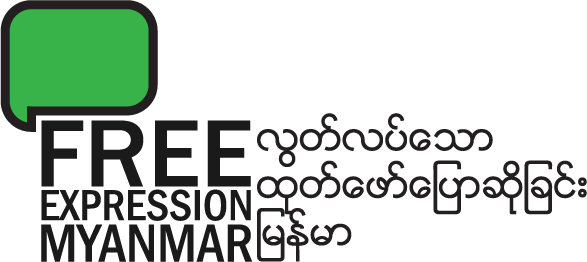Right to information day 2020 — ၂၀၂၀ ခုနှစ် သတင်းအချက်အလက်အခွင့်အရေးနေ့
အစိုးရသည် ၂၀၁၅ မှစ၍ သတင်းအချက် အလက်အခွင့်အရေးကို အားတက်သရော ထိန်းချုပ်၊ ကန့်သတ်၊ ပိတ်ပင်၍ရသည့် ဥပဒေများ၊ မူဝါဒများနှင့် လုပ်ထုံးလုပ်နည်းများ ပြဌာန်းသတ်မှတ်လာသည်။ အစိုးရသည် ရုပ်သံနှင့် ရေဒီယိုလိုင်းအားလုံးကို ထိန်းချုပ်ခြင်း 1၊ မီဒီယာများကိုလည်း လွတ်လပ်စွာမလှုပ်ရှားနိုင်အောင် (သို့မဟုတ်) အများပြည်သူဆိုင်ရာ အင်စတီကျူးရှင်းများထံ လက်လှမ်းမမီအောင် ပိတ်ပင်ထားခြင်း၊ အင်တာနက်ကို ခြေခြေမြစ်မြစ် မဟုတ်ဘဲ စိတ်ထင်တိုင်းပိတ်ခြင်း 2 နှင့် သတင်းဝက်(ဘ်)ဆိုက်များကို ပိတ်ခြင်းတို့ ပြုလုပ်နေ သည်။ 4
အချိန်အတန်ကြာကတည်းက ကတိပေးထားသည့် သတင်းအချက်အခွင့်အရေးဥပဒေကြမ်းမှာ လည်း ၂၀၁၅ နောက်ပိုင်းတွင် ပွင့်လင်းမြင်သာမှုမရှိသည့် သောင်မတင်ရေမကျအခြေအနေ၌ ငြိမ်သက် နေသည်။ ထိုချိန်တွင် ရိုက်တာသတင်းထောက်များကိစ္စဖြစ်ပွားခဲ့ရာ5 ထိုဥပဒေအစား အမျိုးသားမှတ်တမ်းနှင့် မော်ကွန်းဥပဒေကို အစိုးရက ခပ်မြန်မြန် ပြဌာန်းလိုက်သည်။ ယင်းဥပဒေသည် နိုင်ငံတော် လုံခြုံရေးဥပဒေ ကို အထောက်အပံ့ပြုပြီး နိုင်ငံတော်လျှို့ဝှက်ချက်အဖြစ် သိမ်းဆည်းခြင်းကို အားပေးကာ သတင်းအချက်အခွင့်အလက်အရေးကို ဟန့်တားစွက်ဖက်နေသည်။ 6 ယင်းဥပဒေအရ လမ်းညွှန်ချက်တစ်စုံတစ်ရာ သို့မဟုတ် အမှီအခိုကင်းသော ကြည့်ရှုစစ်ဆေးရေးအဖွဲ့တစ်ခုမပါဘဲ အစိုးရသည် မည်သည့်သတင်းအချက်အလက်ကို မဆို “ထိပ်တန်းလျှို့ဝှက်” အဖြစ် သတ်မှတ်ပြီး နှစ်ပေါင်း ၃၀ ကြာအောင် မော်ကွန်းအဖြစ် ဖုံးကွယ် သိမ်းဆည်းထားပိုင်ခွင့် ရှိသည်။ 7လုံခြုံရေးအဆင့် မသတ်မှတ်ထားသည့် သတင်းအချက်အလက်များ အပါအဝင် အစိုးရလက်ဝယ်ရှိသော အချက်အလက်များကို ပြည်သူလူထု သိရှိပိုင်ခွင့်၊ လက်လှမ်းမီပိုင်ခွင့်ကို ယင်းဥပဒေက အသိအမှတ် မပြုပေ။ 8 သတင်းအချက်အလက်သိရှိရန် တောင်းခံသည့် လျှောက်ထားချက်တိုင်းကို အစိုးရကြီးကြပ်ရေးအဖွဲ့တစ်ခုက တစ်ဦးချင်းစီ အတည်ပြုပေးရသည်။ 9
အဆိုပါ သတင်းအချက်အလက်ဆိုင်ရာ အဟန့်အတားများကို ကျော်လွှားရန်နှင့် မိမိတို့၏ သတင်းအချက်အလက်အခွင့်အရေးများကို ကျင့်သုံးရန် ကြိုးစားသူတိုင်းသည် ရာဇဝတ်ကြောင်းအရ အရေးယူခံကြရသည်။ နမူနာအနေဖြင့် မတရားအသင်းများအက်ဥပဒေ 10 သို့မဟုတ် မြန်မာနိုင်ငံအစိုးရလျှို့ဝှက်ချက် အက်ဥပဒေ 11 ဖြင့် အရေးယူခံရနိုင် သည်။ အဂတိလိုက်စားမှုတိုက်ဖျက်ရေးကော်မရှင်သည် အဂတိသတင်းစွပ်စွဲခံရသည့် ရာထူးအာဏာကြီးသူ အများအပြားကို အရေးယူခဲ့သော်လည်း အသရေဖျက်မှုကို ရာဇဝတ်မှုအဖြစ်ပြဌာန်းထားသည့် မြန်မာ့ဥပဒေ ခြောက်ခုတွင် တစ်ခုအပါအဝင်ဖြစ်သော အဂတိလိုက်စားမှုတိုက်ဖျက်ရေးဥပဒေ၌ သတင်းပေးတိုင်ကြားသူ များကို ရာဇဝတ်ကြောင်းအရ အရေးယူခွင့်ပေးထားခြင်းအားဖြင့် သတင်းအချက်အလက်မျှဝေခြင်းနှင့် လက်လှမ်းမီရရှိခြင်းကို တားမြစ်ထားသည်။ 12 ဆက်သွယ်ရေးဥပဒေနှင့် အဂတိလိုက်စားမှုတိုက်ဖျက်ရေးဥပဒေ များကို ပြင်ဆင်ခဲ့သော်လည်း ပြင်ဆင်ချက်များတွင် သတင်းပေးတိုင်ကြားသူကို ကာကွယ်မပေးထားပေ။ 13 မကြာသေးမီကလည်း အစိုးရ၏ ကိုဗစ်-၁၉ ကပ်ရောဂါ တန်ပြန်ရေးလုပ်ငန်းစဥ်တစ်ခုအဖြစ် ကျန်းမာရေးနှင့် ပတ်သက်၍ သတင်းပေးတိုင်ကြားသူများကို ရာဇဝတ်ကြောင်းအရ အရေးယူသည့် လမ်းစဥ်တစ်ခု ချမှတ် ထုတ်ပြန်ခဲ့သေးသည်။ 14အစိုးရသည် သတင်းအချက်အလက်ဆိုင်ရာ အဟန့်အတားများကို ဖန်တီးရုံမျှမက တစ်ခါတစ်ရံတွင်လည်း ပြည်သူလူထု၏ မီဒီယာနှင့် ဒစ်ဂျစ်တယ်အသိပညာနည်းမှုကို အမြတ်ထုတ်ကာ ဘက်လိုက်သော သို့မဟုတ် ဝါဒဖြန့်ချိရေး (ဝါ) သတင်းအတုအယောင်ခေါ်သည့် ပြုပြင်ခြယ်လှယ်ထားသော သတင်းအချက်အလက်များ ကို ဖြန့်ဝေတတ်သေးသည်။ 15 ထိုသို့ လုပ်ဆောင်ရခြင်းမှာ မီဒီယာ၊ အရပ်ဘက်အဖွဲ့အစည်းများနှင့် နိုင်ငံတကာ အသိုင်းအဝိုင်းတို့က ဖြန့်ချိနေသည့် “သတင်းအတု”များကို တန်ပြန်ခြင်းဖြစ်သည်ဟုလည်း မကြာခဏ ကြေးတန်းညှိလေ့ရှိသည်။ 16 ပြည်သူလူထုအတွင်း စနစ်တကျ ကျယ်ကျယ်ပြန့်ပြန် ဖြန့်ဝေ/ပျံ့နှံ့နေသည့် သတင်းအတုများတွင် ရခိုင်ပြည်နယ်အတွင်းရှိ လူမဆန်မှုကျူးလွန်သည်ဟု စွပ်စွဲခံရသည့် ကိစ္စရပ်နှင့် အပြည်ပြည်ဆိုင်ရာ တရားမျှတမှုခုံရုံး (ICJ) တွင် မြန်မာတရားစွဲဆိုခံရသည့်ကိစ္စရပ်များအပေါ် အစိုးရ၏ပုံဖျက်မှု များစွာ ပါဝင်သည်။ 17
Since 2015, the State has adopted laws, policies, and practices which actively control, limit, and block access to information. The State controls all television and radio channels,[1] bans the media from moving freely or accessing public institutions,[2] arbitrarily shuts the internet down,[3] and blocks news websites.[4]
The long-promised Right to Information Bill has remained in opaque limbo since 2015. Instead, in the wake of the Reuters case,[5] the State quickly adopted a National Records and Archives Law which bolsters the Official Secrets Act, furthers State secrecy, and interferes in freedom of information.[6] The law allows a “strictly confidential” 30-year classification to be applied to any information without safeguards or an independent oversight body.[7] The law does not recognise the public’s right to access government-held information, including non-classified information.[8] Any requests for information must be individually approved by a government supervisory body.[9]
Anybody who tries to circumvent these information barriers and exercise their right to freedom of information is criminalised, for example under the Unlawful Associations Law,[10] or Official Secrets Act.[11]
Although the Anti-Corruption Commission has ruled against several powerful individuals accused of corruption, Myanmar’s six criminal defamation laws, which include the Anti-Corruption Law itself, dissuade sharing and accessing information by criminalising whistleblowers.[12] Amendments to the Telecommunications Law and Anti-Corruption Law have not given any protection to whistleblowers.[13] Just recently, the State’s COVID-19 response has included further criminalisation of healthcare whistleblowers.[14]
In addition to creating barriers to information, the State has sometimes capitalised on low levels of public media and digital literacy by disseminating biased or manipulated information, commonly known as propaganda or disinformation.[15] The State often justifies this action under the guise of countering “fake news” spread by the media, civil society, and the international community.[16] Examples of large systematic attempts to disinform the public include the State’s domestic distortion of alleged atrocities in Rakhine State, and distortions of the International Court of Justice case.[17]
[1] FEM (27 February 2017) “Broadcasting Law” https://freeexpressionmyanmar.org/broadcasting-law/
[2] FEM (3 May 2020) “Myanmar’s media not free or fair” https://freeexpressionmyanmar.org/myanmars-media-not-free-or-fair/
[3] FEM (24 June 2019) “Internet Shutdown in Rakhine and Chin States” https://freeexpressionmyanmar.org/internet-shutdown-in-rakhine-and-chin-states/
[4] FEM (2 April 2020) “250 organisations condemn Myanmar government order to block websites” https://freeexpressionmyanmar.org/250-organisations-condemn-myanmar-government-order-to-block-websites/
[5] FEM (3 September 2018) “Show-trial convicts Reuters journalists to 7 years imprisonment” https://freeexpressionmyanmar.org/show-trial-convicts-reuters-journalists-to-imprisonment/
[6] FEM (12 March 2020) “New National Records and Archives Law preserves government secrecy” https://freeexpressionmyanmar.org/new-national-records-and-archives-law-preserves-government-secrecy/
[7] FEM (12 March 2020) “New National Records and Archives Law preserves government secrecy” https://freeexpressionmyanmar.org/new-national-records-and-archives-law-preserves-government-secrecy/
[8] FEM (18 July 2019) “New Bill a big step backwards for RTI” https://freeexpressionmyanmar.org/new-bill-a-big-step-backwards-for-rti/
[9] FEM (18 July 2019) “New Bill a big step backwards for RTI” https://freeexpressionmyanmar.org/new-bill-a-big-step-backwards-for-rti/
[10] FEM (4 April 2018) “Right to truth” https://freeexpressionmyanmar.org/right-to-truth/
[11] FEM (3 September 2018) “Show-trial convicts Reuters journalists to 7 years imprisonment” https://freeexpressionmyanmar.org/show-trial-convicts-reuters-journalists-to-imprisonment/
[12] FEM (3 May 2019) “Defamation? International standards and Myanmar’s legal framework” https://freeexpressionmyanmar.org/defamation-international-standards-and-myanmars-legal-framework/
[13] FEM (6 March 2019) “NGOs call on parliament to consult on draft privacy law amendment” https://freeexpressionmyanmar.org/ngos-call-on-parliament-to-consult-on-draft-privacy-law-amendment/
[14] FEM (25 February 2020) “Proposed bill will punish government staff who release information about Corona” https://www.facebook.com/FreeExpressionMyanmar/posts/2723452031101702
[15] FEM (5 November 2019) “Freedom of the Net: Myanmar in 2019” https://freeexpressionmyanmar.org/freedom-of-the-net-myanmar-in-2019/
[16] FEM (4 April 2018) “Right to truth” https://freeexpressionmyanmar.org/right-to-truth/
[17] FEM (4 April 2018) “Right to truth” https://freeexpressionmyanmar.org/right-to-truth/
More info
“International Day for Universal Access to Information” is a UN recognised day occurring every 28 September.
